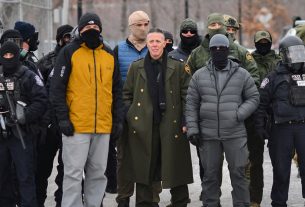((JEWISH REVIEW)) — As he has launched his long-shot campaign for the Republican nomination, Chris Christie has taken aim squarely at the man he once enthusiastically endorsed: Donald Trump.
But alongside portraying the former president as a danger to democracy, Christie has singled out another person for criticism who is not running for president, and who may not even work on a campaign: Jared Kushner, Trump’s Jewish son-in-law and senior adviser.
The Christie-Kushner feud goes back two decades, dating back to when Christie prosecuted a case that sent Kushner’s father to prison. The feud played a decisive role in freezing the former New Jersey governor out of the Trump administration and is making a reappearance as Christie tries again for the White House, following a news-making but unsuccessful 2016 run.
It’s also one of the many ways Christie’s career, forged in a state with more than half a million Jews, has intersected with Jewish issues and public figures. Whether the Garden State candidate claims the nomination or plays the spoiler, as he did eight years ago, here’s what you need to know about Chris Christie and the Jews.
He grew up in North Jersey with Jewish friends
Christie was born in Newark, but raised in Livingston, a heavily Jewish town in northern New Jersey, where he made a lot of Jewish friends at high school.
Among them was Harlan Coben, the bestselling author of potboilers, who once told a Christie biographer, “If you were to ask who in our class would end up being governor, most people would tell you Chris Christie.”
Another was David Wildstein, a top aide whom Christie named to a senior position at the Port Authority of New York and New Jersey and who pleaded guilty to involvement in what became known as “Bridgegate,” a scheme to shut down toll lanes for the George Washington Bridge. (Christie claimed no knowledge of the scheme.)
His brother Todd is married to a Jewish woman. A COVID-19 outbreak at their son’s bar mitzvah in 2021, in the midst of the pandemic, led to the temporary closure of a middle school.
He also has intersected with Rabbi Shmuley Boteach, the author, onetime Republican candidate and New Jersey denizen. In 2015, with Boteach looking on, Christie condemned the Iran nuclear deal spearheaded by President Barack Obama.
He advanced Orthodox-friendly policies as governor
New Jersey has a substantial Orthodox Jewish population, and Christie advocated policies and put forward messages that have traditionally appealed to Orthodox voters. Like another Republican candidate, Florida Gov. Ron DeSantis, Christie advanced school vouchers and other changes that would drive public money to private Jewish schools, although Christie was unsuccessful in launching a voucher program in his state.
As governor, he traveled to Israel and signed a bill prohibiting the state from investing in companies that boycott Israel. But foreign policy has never been his focus or strength: Israel rates no mention at all in his 2019 autobiography, and in 2014, he apologized to the late Republican megadonor Sheldon Adelson for using the term “occupied territories” in reference to the West Bank at a Republican Jewish Coalition event. Supporters of Israeli settlements dispute that Israel is occupying the area.
He clashed with Jared Kushner — and lost
In 2004, real estate mogul Charles Kushner pleaded guilty to tax fraud, witness retaliation and making false statements to the Federal Election Commission, and spent 14 months in prison in Alabama. It was a victory for Christie, then a U.S. attorney.
But 12 years later, that victory would lead to a defeat. Christie was the first among the primary candidates in 2016 to drop out and endorse Trump, and worked hard to secure him the nomination and the presidency. Trump wanted to reward Christie with a top job and named him transition chief. Almost immediately, however, Jared Kushner, Charles’ son, got Christie fired.
Christie saw it coming, he wrote in his 2019 book, where he described the younger Kushner’s initial attempt to talk Trump out of naming Christie transition chief. “It wasn’t fair,” Christie quoted Kushner telling Trump regarding his father’s imprisonment. “You don’t know what it was like for me. Almost every weekend, I flew to Alabama to visit. He didn’t deserve to be there.”
After he was fired, Christie wrote that he learned that a 30-binder transition plan he scripted for Trump had ended up in a dumpster.
Christie remains focused on the Kushners. They earned a place in the subtitle of his autobiography, “Let Me Finish: Trump, the Kushners, Bannon, New Jersey, and the power of in-your-face politics.” An NPR review of the book says, “Christie’s main beef is with Jared Kushner, the son-in-law of President Trump. Christie blames the young Kushner for ousting him from Trump’s inner circle.”
Kushner and his wife, Trump’s daughter Ivanka, also occupied a dubious place in Christie’s campaign launch in New Hampshire on Tuesday night.
“The grift from this family is breathtaking, it’s breathtaking! Jared Kushner and Ivanka Kushner walked out of the White House, and months later he gets $2 billion from the Saudis,” Christie told the crowd. “You think it’s because he’s some kind of investing genius? Or do you think it’s because he was sitting next to the president of the United States for four years, doing favors for the Saudis? That’s your money. That’s your money he stole and gave it to his family. So that makes us a banana republic.”
He has drawn a parallel between Trump and an antisemitic right-wing movement
Christie has made no secret that his principal aim is to neutralize the man he was among the first to endorse in 2016, because he now sees Trump as a menace. Speaking at the Republican Jewish Coalition’s annual conference last year, he illustrated his criticism of Trump via a comparison to a foe of Israel — Iran.
“Every day we need to stand with the only democracy in the Middle East with Israel and stand against the terrorism of Iran, all across the world,” he said. “Because whether you’re talking about Iran, or whether you’re talking about those who aspire to this in our country, authoritarian dictators only want one thing — they just want one more chance to fool the crowd one more time.”
Reelecting Trump, he said, would diminish America’s standing in the world. “But if we’re not doing [democracy] here, we can’t stand up in those other countries and tell them to do it,” he said. “It’s time for us to get our house in order.”
Christie, who was cheered throughout much of his speech, knew the room, which was packed with donors and activists who appreciated Trump’s vehemently pro-Israel foreign policy, but who were wary of his mercurial personality and his flirtations with the far-right. Christie also drew a parallel between Trump and the right-wing John Birch Society of the mid-20th century.
“It was a dangerous time where Republican politicians throughout the country were afraid. They were afraid to speak out. They were afraid to oppose these folks. Because what they were told was if you oppose them, you cannot win a Republican primary. You cannot be a nominee.”
He also was among the first and most outspoken Republican voices to condemn Trump last year for dining with antisemites Kanye West and Nick Fuentes.
Over the years, Christie has had plenty of Jewish donors, including veteran Virginia-based fund-raisers William and Bobbie Kilberg. It’s not clear yet whether past contributors, including hedge funder Steve Cohen and Nick Loeb, the innovator of Onion Crunch, will back him this time.
“Somebody has to directly take on Trump and make it clear that he’s a danger to the future of democracy and that we cannot have him as our nominee,” Bobbie Kilberg told The Philadelphia Inquirer last week. “Chris is running to do that directly and forcibly. Only time can tell whether he can succeed, but it’s exceedingly important to put yourself out there.”




